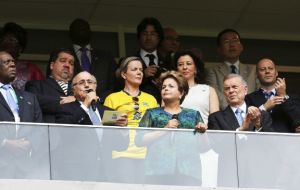MercoPress. South Atlantic News Agency
Booing down of President Rousseff reflects growing dissatisfaction with the economy
 FIFA’s Blatter and an ill-humored President Rousseff trying to address the crowd
FIFA’s Blatter and an ill-humored President Rousseff trying to address the crowd Inflation, slower growth, street protests over the increase in bus fares smacked full on at an ill-humoured Brazilian president Dilma Rousseff during the opening ceremony of the Confederations Cup in Brasilia when she was booed down three times and simply had to declare the event open.
The crowd of almost 70,000 fans at Mane Garrincha Stadium in Brasilia repeatedly showed their disapproval at the opening Brazil-Japan match when President Rousseff's name was read out by FIFA president Joseph Blatter during the speech to officially inaugurate the tournament.
“Brazilian football fans, where is the respect and fair play, please more respect?” Blatter said to no avail, rather the contrary.
According to Brazilian analysts it was the finishing touch for an irritating week full of disappointments for President Rousseff and her team, flooded by criticisms regarding high inflation, meagre growth, an increasing dollar and thousands in the streets of the country’s major cities to protest an 8% increase in public transport fares.
The Rousseff administration reaction so far has been to blame the opposition for what they claim are “chaos salesmen” and “pessimism preachers”, which also included the media that was blamed for part of this “informative terrorism” and helping create an ‘unreal situation’ about the Brazilian economy.
The government’s view is that inflation is going to fall; unemployment will remain low and growth will be greater this year and thus ignores or brushes aside the signals of dissatisfaction in certain sectors of the Brazilian population in leading cities, Sao Paulo and Rio do Janeiro.
In these cities spontaneous protests against the increase in bus fares, some of which turned violent with bus-torching, vandalism against public and private property and clashes with riot police that reacted with tear gas and rubber bullets, promise to continue. There are no apparent political influences behind the protests, just simply organized through the social networks of angry citizens with events.
The latest public opinion polls show President Rousseff’s popularity losing several points fuelled by an overall pessimism about the Brazilian economy performance, inflation and concerns that billions of dollars of public money spent on World Cup and Olympics projects could be better invested in much needed upgrading of essential public services.
This was also palpable outside the Man Garrincha stadium which had a solid police protection as homeless militants, indigenous peoples demanding return of their lands, women’s rights groups among others, tried to interfere with the event and were involved in skirmishes with riot forces.
Finally Brazilian analysts argue that in effect the economic situation of Brazil is not that tragic, but President Rousseff’s bid for re-election next year is anticipating it won’t be an easy competition, (almost one horse race) as was forecasted. There is dissatisfaction with economic policy, anger in the streets, and even when some of the targets could be achieved (lower inflation and stronger economic growth) the international scenario is showing that the bonanza decade is coming to an end, and so could the humor of Brazilians.




Top Comments
Disclaimer & comment rules-

-

-

Read all commentsSounds like a Frau Blucher moment.
Jun 16th, 2013 - 04:51 pm 0Oh dear, trouble at mill.
Jun 16th, 2013 - 06:32 pm 0And when Argentina implodes that will up the pressure even more.
Jun 16th, 2013 - 08:12 pm 0Commenting for this story is now closed.
If you have a Facebook account, become a fan and comment on our Facebook Page!